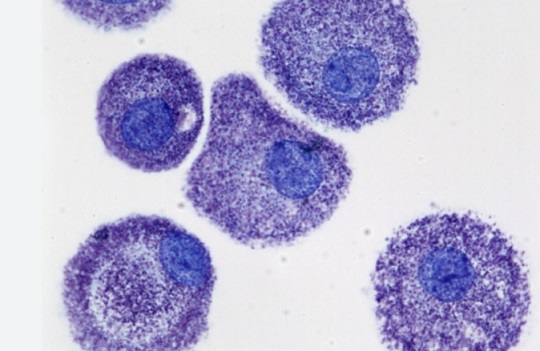New Research Shows That Mast Cells Are Targets of Coronavirus Spike Protein Attacks
Nikhil Prasad Fact checked by:Thailand Medical News Team May 05, 2025 9 months, 2 weeks, 4 days, 19 hours, 45 minutes ago
Medical News: A groundbreaking study by researchers from the Guangzhou Institutes of Biomedicine and Health at the Chinese Academy of Sciences and the State Key Laboratory of Antiviral Drugs at Henan Normal University has revealed how spike proteins from coronaviruses—including SARS-CoV-2—can cause immune cells called mast cells to explode in a process known as degranulation. This immune reaction may be responsible for much of the severe inflammation seen in COVID-19 and possibly in other coronavirus-related illnesses.
 New Research Shows That Mast Cells Are Targets of Coronavirus Spike Protein Attacks
New Research Shows That Mast Cells Are Targets of Coronavirus Spike Protein Attacks
Mast cells normally serve as sentinels in the immune system, especially at the borders between the body and the outside world, such as the skin, airways, and intestines. They are best known for their role in allergic reactions, but they also defend the body against infections. However, this
Medical News report uncovers a much more complex and alarming role for these cells during viral infections.
How Spike Proteins Activate Mast Cells
The researchers demonstrated that spike proteins from a variety of coronaviruses—including SARS-CoV-2, SARS-CoV, MERS-CoV, and several seasonal human coronaviruses—can bind to receptors on mast cells and directly trigger them to degranulate. This process involves the cells rapidly releasing potent inflammatory substances like histamine and cytokines, which then lead to tissue inflammation, fluid leakage, and damage.
Using various human mast cell lines, such as HMC-1, LUVA, and LAD2, the study showed that when spike proteins attach to receptors like ACE2, DPP4, and APN on these cells, it sets off a chain reaction inside the cells. The spike protein interaction activates a group of molecules starting with Src kinases, then triggers the PI3K/AKT pathway, and finally causes a flood of calcium ions inside the cells. This calcium surge drives granules within the cells to burst outwards—an inflammatory explosion.
Confirming the Reaction Across Coronaviruses
To test whether this was unique to SARS-CoV-2, the team also used spike proteins from other coronaviruses, including HCoV-NL63, HCoV-229E, HCoV-OC43, and HCoV-HKU1. All of these were able to activate mast cells to varying degrees. Interestingly, spike proteins engineered to have a weaker ability to bind to receptors did not cause this reaction, showing that receptor binding is essential for the effect.
Furthermore, when actual viruses (rather than just isolated spike proteins) were used to infect the mast cells, a similar explosive release of inflammatory substances occurred. Blocking the PI3K signaling pathway with specific inhibitors or using drugs that prevented calcium influx or disrupted the microtubules inside the cells successfully stopped the degranulation, confirming the precise pathway involved.
Wider Implications for COVID and Long COVID
Transcriptome analysis—a study of how genes are turned on or off—revealed
that exposure to spike proteins upregulated hundreds of genes linked to inflammation, including well-known inflammatory molecules like IL-1β, IL-6, TNF-α, and various chemokines. These genes are known to drive many of the symptoms seen in severe COVID-19 and even in long COVID cases.
What is particularly troubling is that mast cell degranulation is not just a bystander effect. The reaction may play a direct role in damaging lung tissue, impairing immune function, and worsening systemic inflammation—features commonly seen in hospitalized COVID-19 patients and individuals suffering from long-term effects of the virus.
Conclusion and Future Directions
This detailed study not only identifies the spike protein as a direct trigger for mast cell activation but also maps out the exact molecular pathway involved. It shows that the Src/PI3K/AKT signaling cascade, coupled with intracellular calcium and microtubule dynamics, is critical for the explosive immune response observed. These findings open the door for new therapeutic strategies targeting mast cells to reduce inflammation and tissue damage in COVID-19 and possibly other viral infections.
With mast cells now confirmed as a key player in virus-induced hyperinflammation, especially in COVID-19 and its long-term aftermath, future treatments may involve mast cell stabilizers or inhibitors of the Src/PI3K/AKT pathway. Blocking these pathways early in infection could reduce the risk of severe inflammation and organ damage. Understanding how viral proteins interact with the immune system at the cellular level is crucial in the fight against current and future pandemics.
The study findings were published in the peer reviewed Journal of Virology.
https://journals.asm.org/doi/10.1128/jvi.00078-25
For the latest COVID-19 News, keep on logging to Thailand
Medical News.
Read Also:
https://www.thailandmedical.news/news/role-of-mast-cells-and-basophils-in-fighting-major-viral-infections-including-covid-19
https://www.thailandmedical.news/news/covid-19-linked-to-dangerous-lung-scarring-through-mast-cell-activation
https://www.thailandmedical.news/news/could-human-lung-mast-cells-be-reservoirs-for-sars-cov-2
https://www.thailandmedical.news/articles/coronavirus
https://www.thailandmedical.news/pages/thailand_doctors_listings
